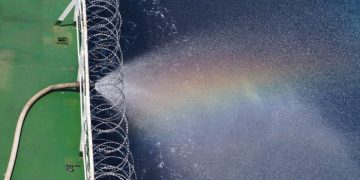ICS Chairman Warns of Chaos Caused by Regional Shipping Regulation
Addressing members of the Singapore Shipping Association (Monday 20 April) the Chairman of the International Chamber of Shipping, Masamichi Morooka, warned about the dangers of regional maritime regulation being adopted by governments at variance to the global maritime Conventions adopted by IMO. “Global rules for a global shipping industry is not just a slogan,” said Mr Morooka before criticising the approaches to the regulation of shipping being pursued by the United States and the European Union. Mr Morooka began by highlighting the big problem caused by the different ballast water treatment regime that applies in the United States to that adopted by the IMO through the Ballast Water Management Convention. “Whether we like it or not, the political reality is that the IMO Convention is probably going to enter into force, sooner rather than later, and we therefore have to make it work. But the conflicting IMO and U.S. requirements, when combined with the lack of systems fully approved by the United States, could produce an impossible dilemma in which some ships might not be able to operate in U.S. waters if the IMO Convention enters in force before U.S. approved equipment is commercially available.” He added: “The problem ...
Read more





















































